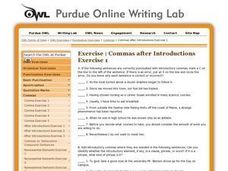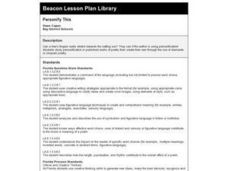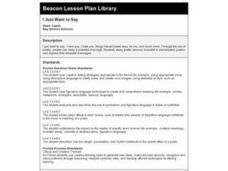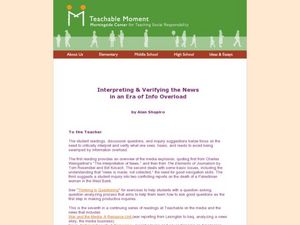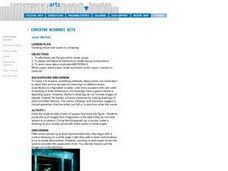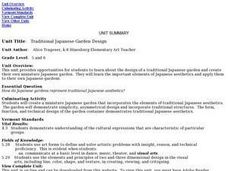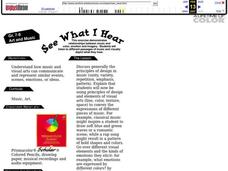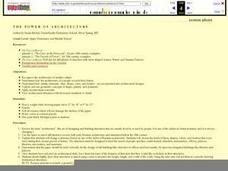Curated OER
Commas After Introductions Exercise 1
In this three part comma usage worksheet, students are first given sentences where they must correct errors in comma usage. Students then go on to punctuate sentences with commas after introductory words and phrases, then they must write...
Curated OER
I'm A Poet and Now I Know It
Eighth graders gather ideas generated from other poems and their own inspiration, to create original poetry. A celebration is included as students bind and submit poems for publication.
Curated OER
Heaven or Ground Hog Day?
Learners discover the ideas of enlightenment by reading historical poetry. In this philosophical lesson, students read poems by Sir Walter Scott and Sergeant Joyce Kilmer while discussing the themes of the writing with classmates....
Curated OER
Headless Horseman, Heady Author
Twelfth graders explore figurative language as it appears in Washington Irving's original text, The Legend of Sleepy Hollow, answer questions based on story, and write sequels to it by using the different types of figurative language...
Curated OER
Personify This
Eighth graders study personification in published works of poetry, then create their own through the use of diamante or cinquain poetry. They read and discuss poetry by Shel Silverstein, William Jay Smith, and Elinor Wylie.
Curated OER
I Just Want to Say
Eighth graders study poetic devices included in conversation poems and explore their eloquent messages. They read and discuss poems by Langston Hughes and Don Marquis.
Curated OER
Oh, Let the Rain Fall Down
Fifth graders explain the three phases of the water cycle in a narraive paragraph where they describe the journey of a single raindrop. They are introduced to five science vocabulary words and personfication.
Curated OER
The Voices Within Theirs and Mine
Students create new words to convey their thoughts. They find, list and discuss the poetic devices used by the poet in creating his or her war poem and create their own war poems. They use sensory perception words and memory in...
Curated OER
Principles of Design
Students study the principles of design by viewing a PowerPoint presentation and then find examples of those principles in magazines. They look through magazines or sketch clothing that exhibit the principles of design and show their...
Curated OER
Of Mice and Men: Viewing Guide
In this Of Mice and Men viewing guide worksheet, students study movie terminology as they read brief descriptions and respond to 26 short answer questions as the watch the film based on Steinbeck's novel.
Curated OER
Interpreting & Verifying the News in an Era of Info Overload
Students practice their critical thinking skills. In this media awareness lesson, students read articles about media overload and interpretation of media. Students respond to discussion questions and discuss how they verify news....
Curated OER
Jane Eyre - Essay Questions
In this literature worksheet, students respond to 10 short answer and essay questions about Bronte's Jane Eyre. Students may also link to an online interactive quiz on the novel at the bottom of the page.
Curated OER
Creating Mood and Space in a Drawing
Students take photos of spaces that imply the figure. (Students could also pull images from magazines from the web if they do not have access to a camera.) Using the photograph as a source, make a drawing as you usually would with black...
Curated OER
Tessellation Design And Construction
Young scholars study the basic elements and concepts of the visual art's perceptual component - such as shape, line and color. They create tessellations that foster problem solving and reflective thinking.
Curated OER
Traditional Japanese Garden Design
Pupils create a miniature Japanese garden that incorporates the elements of traditional Japanese aesthetics. They study the simplicity, asymmetrical design and incorporate traditional structures.
Curated OER
See What I Hear
Students examine relationships between music and color, emotion and imagery, listen to different passages of music, and visually depict what they hear.
Curated OER
"In Like a Lion, Out Like a Lamb"
First graders listen to the story "Cloudy With A Chance of Meatballs" by Judi Barrett. They discuss weather forecasting and create an art project to go with the saying about March weather: "In Like a Lion, Out Like a Lamb".
Curated OER
T H E P O W E R O F A R C H I T E C T U R E
Pupils arecognize the architecture of another culture, how the architecture of a people records their history, explore artistic elements, explore and use geometric concepts of shape, pattern, and symmetry.
Curated OER
Families and Neighborhoods
Students explore the concept of community. In this community lesson, students explore the cultural flavor of their neighborhoods as they discuss the history of their neighborhoods and draw pictures of their family and a building in their...
Curated OER
Octavio Paz
Tenth graders read and analyze the poem, "The Street," by Hispanic author, Octavio Paz. They research the life of Octavio Paz and identify his literary contributions. They complete an online scavenger hunt and create an author map of...
Curated OER
Our Illuminated Alphabet TESTing
Students practice writing letters of the alphabet and explore how decorated letters can be used to convey stories or symbolic ideas. They create an "illuminated" alphabet in which each letter conveys concepts of home and family.
Curated OER
Our Illuminated Alphabet
Young scholars write letters of the alphabet and explore how decorated letters can be used to convey stories or symbolic ideas. In this decorating alphabet lesson, students create an “illuminated” alphabet in which each letter conveys...
Curated OER
Introduction to the Principles of Design & Balance
Students explore the relationship of the principles of design to the elements and also the principle of balance. They demonstrate knowledge of fashion strategies. Students distinguish between line, texture, color, shape/form and patterns.
Curated OER
Border Teatro
Students analyze elements unique to the Chicano art form of the teatro (theater) and examine history connected to the form, namely the farm workers' movement of the 1960's.


